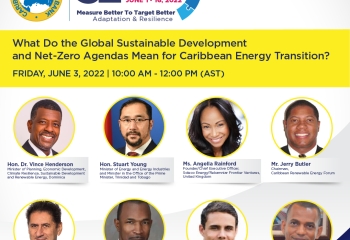Advocates Seeking Greater Buy-In and Commitment to Gender Mainstreaming
While the Caribbean has made definite strides towards achievement of gender quality, research suggests that there is still a wide range of related challenges which stymie the potential for economic and social development of the region.
This, from gender advocates, during day three of the Caribbean Development Bank's (CDB) seminar on Gender Mainstreaming in Caribbean Trade Policies currently underway at the CDB's Headquarters in Barbados. The highlights of Day Three were presentations from Jamaica's Senator Marlene Malahoo-Forte and UN Women representative, Christine Arab, who both sought to gain further buy-in and commitment to gender mainstreaming from the relevant country delegates.
Senator Malahoo-Forte said, "We (the Caribbean) have made gains but are still behind on a wide range of issues. We must take into account the differentials between men and women and we have to explore them through gender analysis. Unless you are all (personally) convinced that the case for gender is well made and that trade policies need to be informed by gender differentials, the region will not recognise the gains to be derived from gender mainstreaming."
A strong advocate for Justice Reform, Malahoo-Forte reminded the participants that people lie at the heart of all business transactions and that development through trade policies and programmes must lead to equitable benefits for women and men.
Part of the CDB's strategic focus is on supporting capacity development and strengthening economic management in critical growth sectors in BMCs. The Bank is committed to targeting and responding to underlying determinants of access to economic opportunities for women and men in areas such as entrepreneurship, in order to contribute to an improvement in the overall development outcomes of the region.
Christine Arab of UN Women shared with delegates that while the Caribbean's civil service and the education sector were in fact dominated by women, current research suggested that gender inequality was still a real problem facing women at various strata of society.
Presenting on Gender & Decent Work as part of the post 2015 Agenda, Arab shared that upwards of 50% of poor households in the Caribbean are headed by women. She also indicated that the data suggests that men need lower levels of education to earn income in the region and are still earning more than women in some areas, in spite of the existence of "equal pay" policies and legislation. Arab said women seek out advancement via education and are outperforming men in this area because they view it as the only way to increase their competitiveness on the job market.
Arab's data made the case for the policymakers to go beyond the "image" of gender equality to ensuring gender responsive policies were in place.
Both presentations provided an effective backdrop for the afternoon's working groups where the delegates explored approaches to gender analysis and mainstreaming within the Culture and Entertainment industry and the Spa and Wellness sector.
Participants were invited to identify areas for further support for integrating gender in current policy development and programming in the trade and export sectors in their countries.
The four-day seminar which ended on June 19th, is expected to yield a Position Paper on Gender Mainstreaming in Caribbean Trade Policies and Programmes. The seminar brings together over 30 trade policymakers and regional development partners from across the region with the main objective of increasing the awareness of the value of gender mainstreaming in national economic development strategies.


